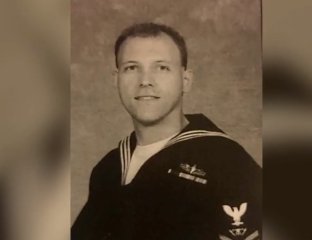Navy Veteran Charts New Course After Substance Misuse
3-minute read
Navy Veteran Charts New Course After Substance Misuse
3-minute read
As Rick now understands, it was only a matter of time before his two decades of drug misuse, alcohol misuse and inattentiveness to underlying mental health challenges caught up to him.
For Rick, a U.S. Navy Veteran, that moment came on Christmas Eve 2014, when an incident he scarcely remembers landed him in a county jail. That moment also became a turning point, setting him on a path to the substance misuse recovery programs and mental health treatments that would turn his life around. The results of his treatment showed him that it’s never too late to change course and learn a better way.
“I want other people to know that there’s a way through this,” Rick says. “It may not be the same way for [any] two people, but there are many, many good things that are available out there.”

This Veteran found hope in therapy
A rough transition
Rick joined the U.S. Navy in 1989 and served until 1995 as a fire control technician. “It was an adventure,” Rick recounts. “I saw many beautiful parts of the world. I got to serve with some of the most amazing service people.”
However, in retrospect, Rick realizes he entered the Navy with complex posttraumatic stress disorder (PTSD) from pre-service challenges in his life. “It was very hard because I had no significant evaluation as to what it was that was driving my behavior,” he says. “The only real opportunities I had to kind of abate it was to drink it off.”
Rick’s substance misuse worsened after he left the service on disability and struggled with the transition from a very structured military environment to an unstructured civilian one. He started misusing the oxycodone and diazepam he had been prescribed. “I was really going overboard, and I was drinking on top of it,” he says.
This “love affair for self-medication” continued for 23 years, he says.
“The beginnings of my healing”
Rick’s untreated PTSD, drinking and drug use challenges came to a head at a family gathering on Christmas Eve 2014. By that point, he says, he had become “very irrational at times” and “kind of lost touch with reality.” That holiday night, he experienced a breakdown that ended with him being arrested.
Rick remained in a county jail for 21 days, painfully detoxifying, until his wife and other people in the community successfully advocated for him to be released to a VA trauma recovery unit for inpatient care. He describes his first four months of inpatient care as “the beginnings of my healing.”
Rick says his time in the trauma recovery unit with other Veterans showed him that he wasn’t alone. He also came to understand that he needed to examine the person he had become to find who he really was.
“That was just the beginning of the process,” Rick says. “But it opened the door enough that I could get a foot in.”
For Rick, cognitive behavioral therapy (CBT) worked best.
“It led me to understand my triggers,” Rick says. “It led me to understand where I had gotten sidetracked. And gave me a path through it — through self-evaluation, through group discussion — where I could really bring it out into the open and deal with it for the first time in my entire life.”
Once the door opened, he also benefited from equine therapy, writing therapy and recreational activities like fly-fishing and ceramic arts — an artistic interest he had set aside when he joined the Navy. “After five years of recovery and numerous different types of recovery, not just one, I found myself,” Rick says. “I finally found out who I am and what I’m made of and what I’m really driven by.”
“My entire life, up until about five years ago, was a series of very chaotic mistakes that somehow went right,” Rick adds. “Going to jail was not right. But the end result of that was recovery. Recovery from the drug addiction, recovery from the alcohol problem — but most importantly, the recovery from the complex trauma of my life.”
Hope for everyone
Rick says his life now is “about helping other people,” and part of that mission is telling his story so people in situations like his can understand that there is a way forward.
“There wasn’t an aspect of it [my treatment] that I don’t look back on now with a great deal of hope for other people,” Rick says. “There’s a winning combination going on with the CBT in conjunction with recreational therapies, in conjunction with substance abuse cessation or abatement.”
“There are legitimate ways to heal,” he says. “And there are people out there who genuinely care and will listen and help you. It’s really an awakening experience, so allow yourself to be awakened.”

